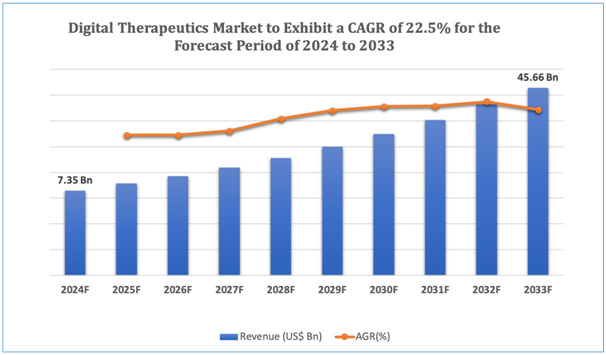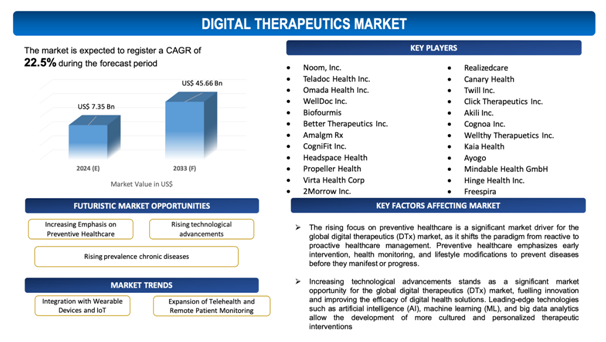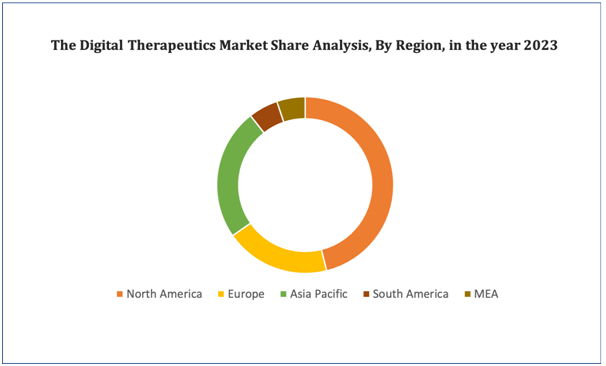Digital Therapeutics Market Overview
The global digital therapeutics market is estimated to be worth over USD 45.66 Bn in 2033 and is expected to grow at CAGR of 22.5% during the forecast period (2024-2033).
Digital therapeutics (DTx) portrays a progressive branch of healthcare, employing software-based interventions to avoid, administer, or treat medical conditions. In contrast with conventional treatments, digital therapeutics provide evidence-based therapeutic interventions through digital platforms, such as sensors, mobile apps, and wearables. These interventions are intended to modify patient behavior, facilitate adherence to prescribed therapies, and offer real-time monitoring and feedback, often supplementing or even replacing traditional drug therapies.
The global digital therapeutics market is proliferating, fuelled by numerouscrucial factors. The growing prevalence of chronic ailments like cardiovascular diseases, diabetes, and mental health disorders requiresadvanced approaches for management and treatment. DTx provides personalized treatment plans on the basis of real-time data and patient behaviour, substantiallyimproving patient outcomes. In addition, the soaring adoption of smartphones and internet penetration worldwidesupports the widespread use of digital health solutions, expanding the reach of digital therapeutics.
Major opportunities in the DTx market comprise the incorporation of artificial intelligence and machine learning, which can improve the precision and efficiency of digital interventions. AI-driven analytics can predict patient behaviours and outcomes, allowing proactive and personalized therapeutic measures. Additionally, regulatory support and recognition of DTx as legitimate medical interventions by authorities like the FDA have proliferated market conviction and propelled product development and adoption.
Latest developments in the digital therapeutics space underlinenotable advancements. For instance, products like reSET and reSET-O by Pear Therapeutics, which are FDA-approved for the treatment of substance use disorders, illustrate the potential of DTx to address complicated health issues. Likewise, digital therapeutics for diabetes management, such as Omada Health and Livongo, are making significant impacts by offering continuous monitoring and behavioral coaching to manage blood sugar levels effectively.
Alongside, novel technologies such as digital biomarkers and remote patient monitoring are extending the limits of what digital therapeutics can achieve. These technologies allow more accurate and dynamic health monitoring, encouraging timely interventions and enhancing chronic disease management.
Therefore, the global digital therapeutics market is on a strong growth trajectory, driven by technological development, surging healthcare needs, and significant opportunities for innovation in disease management and patient care. The alliance between digital health and traditional healthcare practices promises to revolutionizethe therapeutic landscape, offering more accessible, effective, and personalized healthcare solutions.
Figure 1. Digital Therapeutics: Market Size

Get more details on this report - Request Free Sample
Key Market Insights
The global digital therapeutics (DTx) market is witnessingrobust growth, fuelled by technological developments and the growing demand for personalized healthcare solutions. Major market insights exhibit a rise in the adoption of digital health applications and wearables, bolstered by the increasing prevalence of chronic illnesses such as diabetes, cardiovascular ailments, and mental health issues. The incorporation of artificial intelligence (AI) and machine learning (ML) is a remarkable development, improving the efficacy and precision of DTx interventions by predicting patient behaviours and tailoring treatment plans.
The current market panorama is marked by a strong pipeline of digital therapeutic products, with notable approvals and recognitions from regulatory bodies like the FDA, which have legitimized DTx as effective medical interventions. Companies like Omada Health,Pear Therapeutics, and Livongo are leading the charge with innovative products that provide real-time monitoring, behavioral coaching, and comprehensive management of chronic conditions.
Novel technologies such as digital biomarkers and advanced remote patient monitoring systems are revaluating the capabilities of DTx. These technologies support continuous health monitoring and timely interventions, substantiallyenhancing patient outcomes. Moreover, partnerships and collaborations between tech companies and healthcare providers are fostering an ecosystem conducive to the swift- development and deployment of digital therapeutics.
Recent developments underscore the increasing acceptance and integration of DTx into mainstream healthcare practices, fuelled by the proven effectiveness of these solutions in managing and treating different conditions. As digital therapeutics continue to evolve, they commit to transform healthcare delivery by making it more personalized, proactive, and accessible, ultimately improving the quality of life for patients around the globe.
Market Dynamics
Market Drivers
Increasing Emphasis on Preventive Healthcare
The rising focus on preventive healthcare is a significant market driver for the global digital therapeutics (DTx) market, as it shifts the paradigm from reactive to proactive healthcare management. Preventive healthcare emphasizes early intervention, health monitoring, and lifestyle modifications to prevent diseases before they manifest or progress. Digital therapeutics, with their ability to deliver personalized, evidence-based interventions through digital platforms, align perfectly with this approach. They offer tools for continuous health monitoring, behaviour modification, and real-time feedback, which are crucial for effective preventive care.
The growing prevalence of chronic ailments such as hypertension, diabetes, and mental health disorders underscores the necessity for preventive strategies to minimize long-term health risks and mitigate healthcare costs. DTx solutions encourage individuals to take control of their health by offeringpersonalized programs that support healthy behaviours, medication adherence, and regular health check-ups. For instance, digital therapeutic platforms can monitor glucose levels in diabetics, offer reminders for medication intake, and provide dietary and exercise recommendations to preserve optimal health.
In addition to that, the incorporation of artificial intelligence and machine learning in DTx enables for the evaluation of large datasets to determine at-risk individuals and predict potential health issues before they become crucial. This predictive capability facilitates early interventions, minimizing the incidence and severity of chronic conditions.
Healthcare providers and insurers are increasingly acknowledging the value of preventive healthcare, fuelling investments and collaborations in digital therapeutics. This emphasis not only enhances patient outcomes but also minimizes the burden on healthcare systems by reducing the need for extensive medical treatments and hospitalizations. Resultantly, the growing focus on preventive healthcare substantiallyaccelerates the growth and adoption of digital therapeutics worldwide.
Market Restraints
With regard to numerous advantages of digital therapeutics, the market faces several challenges due to the unique characteristics and requirements associated with these potent pharmaceutical products. Some of the key market challenges include:
- Regulatory and Compliance Challenges: The global digital therapeutics market witnessessubstantial regulatory hurdles, as the approval process for digital health solutions can be complicated and varied across different regions. Ensuring compliance with diverse regulatory frameworks and gaining necessary certifications from authorities like the FDA, EMA, and other national health agencies can be time-consuming and costly. These regulatory challenges can delay product launches and multiply development costs, potentially impeding market growth.
- Data Privacy and Security Concerns: As digital therapeutics significant rely on collecting and assessing sensitive patient data, concerns about data privacy and security present a major restraint. Ensuring robust data protection measures to avoid breaches and unauthorized access is crucial, given the stringent data protection regulations like GDPR in Europe and HIPAA in the United States. These concerns can affect user trust and adoption rates, as patients and healthcare providers may be wary of potential data misuse or breaches, constraining the widespread implementation of digital therapeutic solutions.

Get more details on this report - Request Free Sample
Market Opportunity
Rising technological advancements
Increasing technological advancements stands as a significant market opportunity for the global digital therapeutics (DTx) market, fuelling innovation and improving the efficacy of digital health solutions. Leading-edge technologies such as artificial intelligence (AI), machine learning (ML), and big data analytics allow the development of more cultured and personalized therapeutic interventions. These developmentssupport the creation of algorithms that can predict patient behaviours, tailor treatments to individual needs, and offer real-time feedback, substantiallyenhancing patient outcomes.
For instance, AI-driven platforms can evaluateextensive amounts of patient data to determine patterns and predict health risks, enabling for early intervention and personalized care plans. Machine learning models improve the precision of these predictions over time, continuously enhancing the quality of care provided. In addition, advancements in wearable technology and mobile health applications enable continuous health monitoring, offering patients and healthcare providers with real-time data to make informed decisions about treatment and lifestyle modifications.
Telehealth and remote patient monitoring technologies have also seen notable advancements, specificallyon grounds of the COVID-19 pandemic, which has propelled the adoption of digital health solutions. These technologies allow healthcare providers to deliver care remotely, growing accessibility for patients and minimizing the burden on healthcare systems. Alongside, advancements in cybersecurity measures are addressing data privacy and security concerns, making digital therapeutics more reliableand secure.
All in all, increasing technological breakthroughs are expanding the capabilities of digital therapeutics, making them more personalized, effective, and accessible. This progress is accelerating greater adoption of DTx solutions, opening new markets, and ultimately revolutionizing the healthcare panorama by providing innovative ways to manage and treat different health conditions.
Market Trends
- Integration with Wearable Devices and IoT: A major trend in the global digital therapeutics market is the growing incorporation of DTx solutions with wearable devices and the Internet of Things (IoT). Wearables, such as smartwatches and fitness trackers, along with IoT-enabled health devices, offer continuous monitoring of vital signs, physical activity, and other health metrics. This integration enables for real-time data collection and analysis, allowing personalized and adaptive therapeutic interventions. Patients can receive timely feedback and healthcare providers can monitor patient progress remotely, enhancing overall treatment outcomes and adherence.
- Expansion of Telehealth and Remote Patient Monitoring: The expansion of telehealth and remote patient monitoring is another remarkable trend propelling the digital therapeutics market. The COVID-19 pandemic fuelled the adoption of telehealth services, underscoring the convenience and need of remote healthcare. Digital therapeutics solutions are increasingly being integrated into telehealth platforms, providing comprehensive remote care that comprises digital therapy sessions, virtual consultations, and continuous monitoring. This trend not only improves patient access to healthcare services, specifically in underserved or remote areas, but also minimizes the burden on conventional healthcare facilities, leading the way for more efficient and scalable healthcare delivery models.
Digital Therapeutics Market: Key Segments
By Offering
- Programs
- Software/Platforms
- Virtual Reality/Games
By Revenue Modal
- Subscription
- One time Purchase/Licensing
- Outcome/Value based
By Sales Channel
- B2C
- Patients
- Caregivers
- B2B
- Providers
- Payers
- Employers
- Pharmaceutical Companies
- Other Buyers
By Application
- Preventive Applications
- Prediabetes
- Obesity
- Nutrition
- Lifestyle Management
- Other Preventive Applications
- Treatment/Care-related Applications
- Diabetes
- CNS Disorders
- Mental Health Disorder
- Other CNS Disorders
- Chronic Respiratory Disorders
- Musculoskeletal Disorders
- Cardiovascular Diseases
- Smoking Cessation
- Medication Adherence
- Gastrointestinal Disorders
- Substance Use & Addiction Management
- Rehabilitation & Patient Care
- Other Treatment/Care-related Applications
By Key Geographical Regions
- North America
- Europe
- Asia-Pacific
- Middle East and Africa
- South America
Figure 4. Digital Therapeutics Market: Distribution by Region

Get more details on this report - Request Free Sample
Digital Therapeutics Market: Regional Analysis
North America held the highest share in the global market. North America boasts a highly advanced and well-established healthcare infrastructure. The presence of technologically advanced healthcare systems, a high level of digital literacy among healthcare professionals, and a widespread use of electronic health records create a conducive environment for the integration of digital therapeutics.
Leading Digital Therapeutics Developers
Industry Trends and Global Forecasts, 2023-2035 report features an extensive study of the current market landscape, market size and future opportunities associated with the Digital Therapeuticsmarket, during the given forecast period. Further, the market report highlights the efforts of several stakeholders engaged in this rapidly emerging segment of the biopharmaceutical industry. Key takeaways of the Digital Therapeuticsmarket are briefly discussed below.
The report includes the list of players operating in the global digital therapeuticsmarket. Some of the key players include:
- Noom, Inc.
- Teladoc Health Inc.
- Omada Health Inc.
- WellDoc Inc.
- Biofourmis
- Better Therapeutics Inc.
- Amalgm Rx
- CogniFit Inc.
- Headspace Health
- Propeller Health
- Virta Health Corp
- 2Morrow Inc.
- Realizedcare
- Canary Health
- Twill Inc.
- Click Therapeutics Inc.
- Akili Inc.
- Cognoa Inc.
- Wellthy Therapuetics Inc.
- Kaia Health
- Ayogo
- Mindable Health GmbH
- Hinge Health Inc.
- Freespira
Digital Therapeutics Market: Key Developments
- In May 2023, Noom, Inc. announced a new program, Noom Med, designed to fight the disease of obesity. Noom Med is a program that has offers telehealth services with Noom’s personalized psychological tools for patients enrolling for weight loss.
Scope of the Report
The market report presents an in-depth analysis of the various firms / organizations that are engaged in this market, across different segments, as defined in the below table:
|
Key Report Attributes |
Details |
|
Base Year |
2023 |
|
Forecast Period |
2024-2033 |
|
CAGR (2024-2033) |
22.5% |
|
Offering |
|
|
Revenue Model |
|
|
Sales Channel |
|
|
Application |
|
|
Key Geographical Regions |
|
|
Key Companies Profiled |
|
